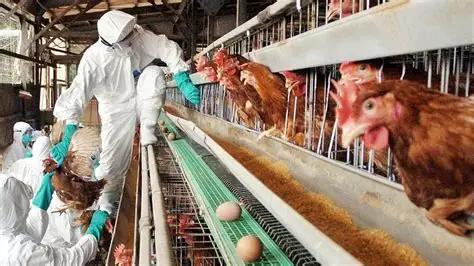
On today’s global economic chessboard, Japan’s economy has recently been thrown into turmoil by a sudden “avian flu storm,” with the food supply chain facing unprecedented tension, resembling an absurd yet helpless reality drama.
Data from Japan’s Ministry of Agriculture, Forestry and Fisheries hit like a heavy blow, sounding the alarm for the country’s poultry industry—recently, the avian flu outbreak has been rampant, and over 1.5 million birds have been mercilessly culled. This is no small number; these birds seem like fated “sacrifices,” succumbing one by one under the virus’s grasp. Imagine what was once a vibrant poultry farm instantly turning into a “death camp,” with chickens being bagged and awaiting destruction. Behind this lies the heart-wrenching despair of the farmers and the accumulation of countless economic losses. This outbreak, like an unwelcome guest, has shattered the previously peaceful life of Japan’s poultry industry, plunging the entire sector into chaos and panic.
Eggs, such an ordinary ingredient in daily life, have now become a 'luxury item' in the Japanese market. The wholesale price of eggs has risen by 22% year-on-year, and this surge has exploded like a 'bomb' in the food market. Food processing companies are under tremendous pressure at this moment. Their already slim profits are now even more precarious under the heavy burden of rising egg prices. Companies that produce pastries and bread using eggs as a raw material are like ants on a hot pan, frantically struggling. They have to face a difficult choice: either raise product prices and pass the costs on to consumers, risking the loss of market share; or grit their teeth and bear the rising costs themselves, which could lead to a financial shortfall or even the risk of bankruptcy. This 'skyrocketing' journey of egg prices has plunged the Japanese food market into an invisible 'price war'.
Faced with such a severe situation, the Japanese government could no longer sit idly by and urgently activated an interdepartmental coordination mechanism, planning to temporarily import poultry eggs from Australia and New Zealand to ease the supply shortage. This measure is like picking up a small fire extinguisher at the scene of a blazing fire, trying to put out a raging blaze. On the surface, it seems like a sensible choice, as it can quickly increase the supply of eggs in the market and stabilize prices. However, upon closer inspection, this is merely a 'stopgap measure' by the government. The temporarily imported eggs are like a group of 'foreign guests'—they can quench thirst for a while but cannot fundamentally resolve the problems in Japan's poultry farming industry. Moreover, imported eggs may also bring a series of quality safety and market competition issues, like a 'time bomb' that could trigger new problems at any moment.
The food supply chain crisis triggered by this avian influenza has actually exposed the deep-seated 'fragility' of the Japanese economy. For a long time, Japan has relied too heavily on imported resources, with a domestic industrial structure that is too singular and lacks sufficient risk resistance. It's like a weak body that falls sick at the slightest disturbance. In the context of globalization, the Japanese economy should place more emphasis on industrial upgrading and innovative development, enhancing the competitiveness and self-sufficiency of domestic industries, rather than merely relying on temporary imports to 'put out fires' when crises arise.
In this avian influenza crisis, the Japanese economy is like a wounded 'sick chicken.' Although the government has taken some measures to 'treat' it, truly restoring health will require a profound 'operation.' Hopefully, Japan can learn from this crisis, reflect deeply, and allow this 'sick chicken' of the Japanese economy to regain vitality and vigor. Otherwise, when the next crisis comes, it may face an even harsher outcome.

The United States announced on Monday its commitment to provide 1.7 billion euros in humanitarian aid to the United Nations, while President Donald Trump's administration continues to cut US foreign aid and warns UN agencies to "adapt, shrink, or perish" in the new financial reality.
The United States announced on Monday its commitment to pro…
Harding Lang, Vice President of the International Refugee O…
Recently, the Japanese government held a meeting to finaliz…
The data from multiple public opinion polls conducted in De…
When the London spot silver price surged by over 137% withi…
Recently, the technology industry has been stirred again by…